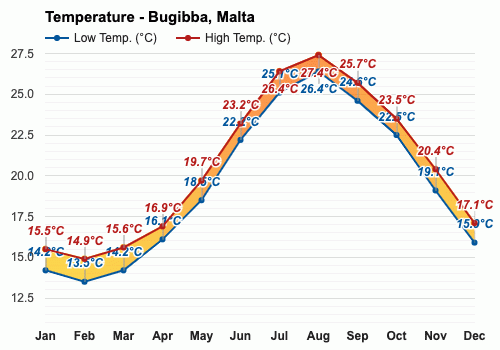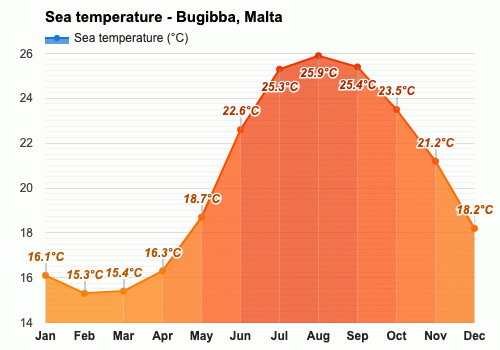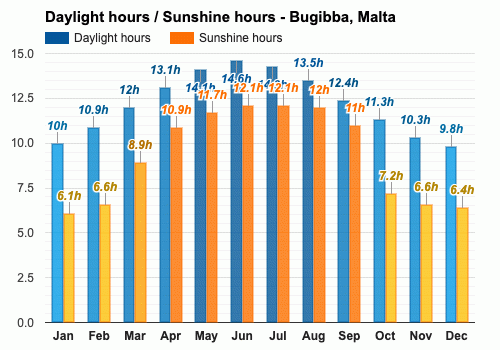Contents
- The climate of Bugibba
- The best time to visit Bugibba
- The worst time to visit Bugibba
- Spring weather in Bugibba
- Summer weather in Bugibba
- Autumn weather in Bugibba
- Winter weather in Bugibba
- Weather in January
- Weather in February
- Weather in March
- Weather in April
- Weather in May
- Weather in June
- Weather in July
- Weather in August
- Weather in September
- Weather in October
- Weather in November
- Weather in December
- Frequently asked questions
- Average temperature
- Average pressure
- Average wind speed
- Average humidity
- Average rainfall
- Average rainfall days
- Average sea temperature
- Average daylight
- Average sunshine
- Average sunshine days
- Average UV index
- Average cloud cover
- Average visibility
The climate of Bugibba
The region's overall weather throughout the year moves from mild winter conditions in January and February, to the hottest months in July and August, and back to cooling conditions by the end of the year. Average monthly temperatures resume a rising trend from 14.2°C (57.6°F) in February, reaching an apex of 27.4°C (81.3°F) in August, and then decline to 15.9°C (60.6°F) by December. Humidity tends to maintain a fairly consistent level throughout the year, varying subtly from 69% in December to 77% in April.
Rainfall in Bugibba follows a distinctive pattern, with almost no rain from May to August, and the highest rainfall of 76mm (2.99") occurring in November. This is complemented by the highest number of rainy days — 15.6 in November. The region also enjoys robust sunshine hours, with July being the sunniest month, accumulating around 12.1 hours per day. A gentle wind maintains a presence throughout the year; however, it reaches its maximum speed of 27.6km/h (17.1mph) in December.
The best time to visit Bugibba
The worst time to visit Bugibba
Spring weather in Bugibba
Summer weather in Bugibba
Autumn weather in Bugibba
Winter weather in Bugibba
Weather in January
Weather in February
Weather in March
Weather in April
Weather in May
Weather in June
Weather in July
Weather in August
Weather in September
Weather in October
Weather in November
Weather in December
Frequently asked questions
How many days does it rain in Bugibba?
What is the month with the least sunshine in Bugibba?
What are the months with the lowest UV index in Bugibba?
What is the coldest time of year in Bugibba?
What is the month with the coldest sea water in Bugibba?
What is the most humid month in Bugibba?
When are the longest days in Bugibba?
What is the month with the most sunshine in Bugibba?
What is the driest month in Bugibba?
When is the highest UV index in Bugibba?
What month is the hottest in Bugibba?
When is the sea warmest in Bugibba?
When is Daylight Saving Time (DST) in Bugibba?
What is the rainiest month in Bugibba?
What is the least humid month in Bugibba?
What is the month with the shortest days in Bugibba?
Average temperature
Bugibba, Malta

The warmest month (with the highest average high temperature) is August (27.4°C).
The month with the lowest average high temperature is February (14.9°C).
The month with the highest average low temperature is August (26.4°C).
The coldest month (with the lowest average low temperature) is February (13.5°C).
Average pressure
Bugibba, Malta

- Average pressure in January:
1017.4mbar - Average pressure in February:
1015.6mbar - Average pressure in March:
1015.4mbar - Average pressure in April:
1014.4mbar - Average pressure in May:
1014.7mbar - Average pressure in June:
1014.4mbar
- Average pressure in July:
1013.9mbar - Average pressure in August:
1014.1mbar - Average pressure in September:
1015.4mbar - Average pressure in October:
1016.1mbar - Average pressure in November:
1015.8mbar - Average pressure in December:
1019.3mbar
The month with the highest atmospheric pressure is December (1019.3mbar).
The month with the lowest atmospheric pressure is July (1013.9mbar).
Average wind speed
Bugibba, Malta

- Average wind speed in January:
27.9km/h - Average wind speed in February:
27.4km/h - Average wind speed in March:
25.4km/h - Average wind speed in April:
22.7km/h - Average wind speed in May:
20.9km/h - Average wind speed in June:
16.7km/h
- Average wind speed in July:
14.3km/h - Average wind speed in August:
13.2km/h - Average wind speed in September:
17.7km/h - Average wind speed in October:
20.2km/h - Average wind speed in November:
23.8km/h - Average wind speed in December:
27.6km/h
The windiest month (with the highest average wind speed) is January (27.9km/h).
The calmest month (with the lowest average wind speed) is August (13.2km/h).
Average humidity
Bugibba, Malta

The month with the highest relative humidity is April (77%).
The month with the lowest relative humidity is December (69%).
Average rainfall
Bugibba, Malta

The wettest month (with the highest rainfall) is November (76mm).
The driest month (with the least rainfall) is July (1mm).
Average rainfall days
Bugibba, Malta

- Average rainfall days in January:
14.2 days - Average rainfall days in February:
11.4 days - Average rainfall days in March:
10.7 days - Average rainfall days in April:
8.4 days - Average rainfall days in May:
4.8 days - Average rainfall days in June:
2.3 days
- Average rainfall days in July:
0.9 days - Average rainfall days in August:
2 days - Average rainfall days in September:
8 days - Average rainfall days in October:
14.8 days - Average rainfall days in November:
15.6 days - Average rainfall days in December:
14.5 days
The month with the highest number of rainy days is November (15.6 days).
The month with the least rainy days is July (0.9 days).
Average sea temperature
Bugibba, Malta

The best month for swimming (with the highest average sea temperature) is August (25.9°C).
The coldest month (with the lowest average sea temperature) is February (15.3°C).
Average daylight / Average sunshine
Bugibba, Malta

- Average daylight in January:
10h and 0min - Average daylight in February:
10h and 5min - Average daylight in March:
12h and 0min - Average daylight in April:
13h and 1min - Average daylight in May:
14h and 1min - Average daylight in June:
14h and 4min
- Average daylight in July:
14h and 2min - Average daylight in August:
13h and 3min - Average daylight in September:
12h and 2min - Average daylight in October:
11h and 2min - Average daylight in November:
10h and 2min - Average daylight in December:
9h and 5min
The month with the longest days is June (Average daylight: 14h and 36min).
The month with the shortest days is December (Average daylight: 9h and 48min).
- Average sunshine in January:
6h and 1min - Average sunshine in February:
6h and 4min - Average sunshine in March:
8h and 5min - Average sunshine in April:
10h and 5min - Average sunshine in May:
11h and 4min - Average sunshine in June:
12h and 1min
- Average sunshine in July:
12h and 1min - Average sunshine in August:
12h and 0min - Average sunshine in September:
11h and 0min - Average sunshine in October:
7h and 1min - Average sunshine in November:
6h and 4min - Average sunshine in December:
6h and 2min
The months with the most sunshine are June and July (Average sunshine: 12h and 6min).
The month with the least sunshine is January (Average sunshine: 6h and 6min).
Average sunshine days
Bugibba, Malta

- Average sunshine days in January:
13.3 days - Average sunshine days in February:
15.2 days - Average sunshine days in March:
19 days - Average sunshine days in April:
19.7 days - Average sunshine days in May:
23.8 days - Average sunshine days in June:
26.3 days
- Average sunshine days in July:
29.8 days - Average sunshine days in August:
27.8 days - Average sunshine days in September:
19.5 days - Average sunshine days in October:
13.7 days - Average sunshine days in November:
12 days - Average sunshine days in December:
12.4 days
The month with the most sunshine days is July (29.8 days).
The month with the least sunshine days is November (12 days).
Average UV index
Bugibba, Malta

The months with the highest UV index are July and August (UV index 7).
The months with the lowest UV index are January, February and December (UV index 4).
Average cloud cover
Bugibba, Malta

The month with the most cloud cover is January (Cloud cover 35).
The month with the least cloud cover is July (Cloud cover 4).
Average visibility
Bugibba, Malta

The months with the highest visibility are January, February, March, April, May, June, July, August, September, October, November and December (10km).
The months with the lowest visibility are January, February, March, April, May, June, July, August, September, October, November and December (10km).
Bugibba, Malta
Weather forecast for your location
2. Allow the app to use your location


